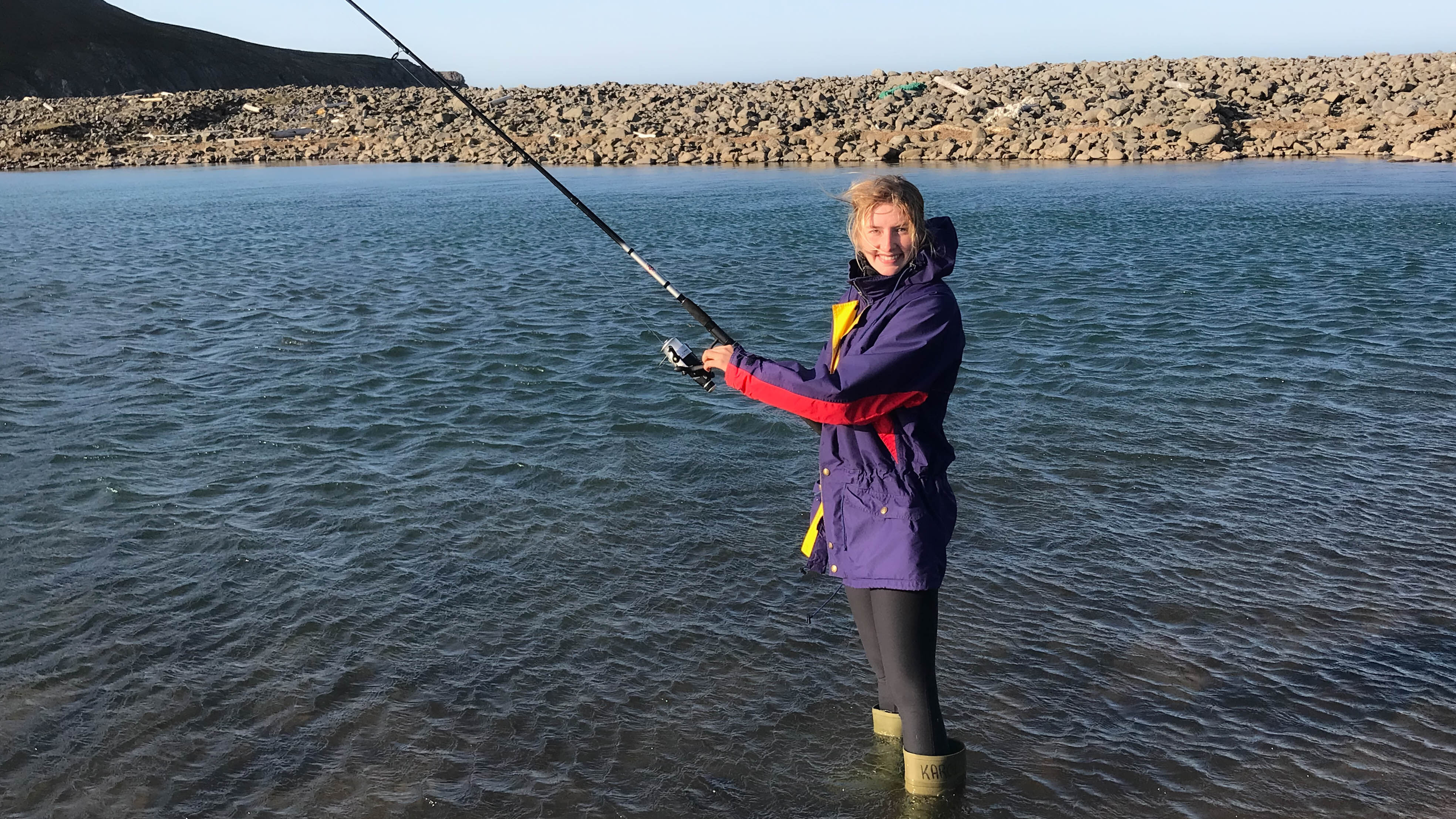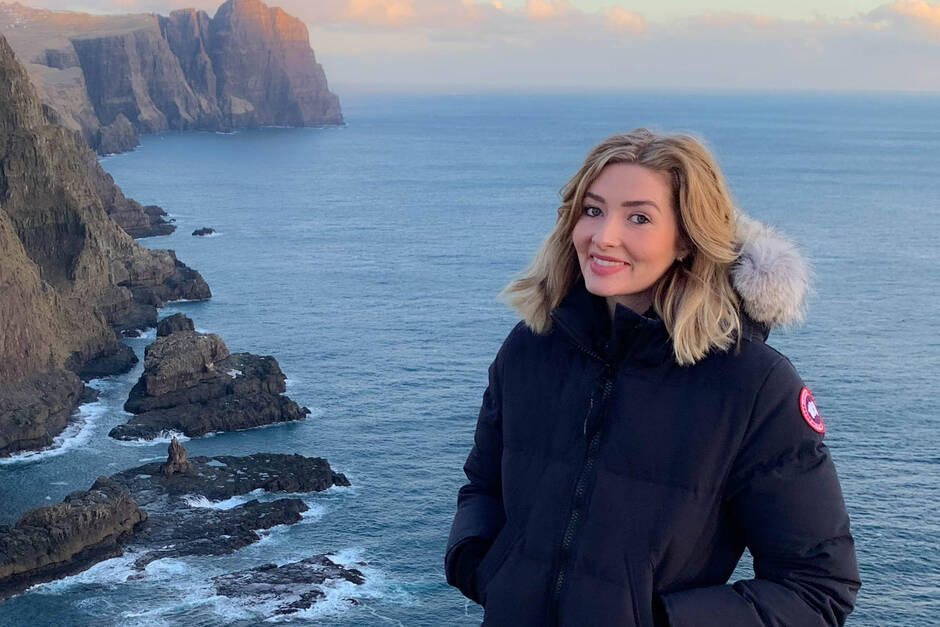Gunnlaug Ásgeirsdóttir, Iceland
Sustainable Energy, Class of 2022
Name: Gunnlaug Helga Ásgeirsdóttir
Age: 25
Hometown: Ólafsfjörður, Iceland
Academic Background: B.Sc. in Fisheries Science, University of Akureyri (University of Akureyri), IS
Major & Class: Sustainable Energy, Class of 2022
Why did you choose Iceland School of Energy for your graduate studies?
I have always been fond of sustainable resources. Growing up in Ólafsfjörður, a small fishing village in the north of Iceland, definitely spurred an interest in sustainability and preserving our natural world. We need the wind, the water, the heat, and the sun to power our lives. Nature is not only what we see. It has a certain energy that is possible to feel, taste and touch. We will always have to sacrifice a little bit of nature, but what matters is how we do it. After studying Fisheries Science at the University of Akureyri, I wanted to broaden my knowledge. I saw that Iceland School of Energy was a perfect opportunity to learn more about how to sustain resources, particularly on land.
So far, how has your ISE experience been?
My experience so far has been very good, but it has been a little different than I expected because of the COVID-19 pandemic. Most of our classwork is done through Zoom meetings, breakout rooms, and group projects. Luckily here in Iceland the COVID pandemic has been mostly under control and there has been a lot of opportunities to safely meet up in-person. Whether it's through the internet or in-person, we have gotten to know our classmates very well and become close friends.
Another great aspect of ISE is that we can specialize and customize our class schedule based on our interests. Whether it is engineering, public policy, geothermal energy, circular economics or energy management.
What has been the most rewarding part of this entire experience?
The most rewarding part of this experience has definitely been how easy and fun it has been to get to know my fellow ISE classmates. Our class is really diverse with students from all around the world. Our group trips are always a fun way to explore Iceland and get to know each other better as well.
What do you enjoy about living in Iceland?
I love the swimming pools. I literally love them. It is so nice to relax in the hot geothermal water. Árbæjarlaug is my favorite pool and I go almost every single day. The pools are really nice and there are so many different things you can do. You can just relax and enjoy yourself, exercise or even talk about politics.
I also love nature. It is all around you here in Iceland and gives you so much freedom. All you need to do is turn in one direction and set out on an adventure. Right outside Reykjavík there are mountains to climb and if you drive for a while, you can be up in a glacier or you could find yourself in terrain that feels like Mars or the Moon. I really like the short distances between places and how easy it is to access nature in all its forms.
So far, what has been your most interesting experience living in Iceland?
The COVID-19 pandemic. One of the most interesting things about Iceland is that whenever there is something bad going on, like COVID-19 or a natural disaster, the Icelandic people tend to stick together. We team up. That is what I find really interesting. I do not think every nation is able to say this. There is some beauty in being a small country. For example, recently in Seyðisfjörður there were some devastating landslides just before Christmas and the whole town was evacuated. All across Iceland people opened up their homes and pitched in to make sure that everyone from Seyðisfjörður had a warm home and a bit of holiday cheer in light of the tragedy.
What would be your advice to someone new coming to Iceland?
Number one rule, bring a good jacket. The weather is unpredictable and umbrellas will not work.
Also, you might find that Icelandic society is a little closed off at first but be aware that Icelanders are generally very kind and always want to help out. It might just mean that you need to take the first step, be direct, and take an initiative. There are many wonderful Facebook groups in Iceland for nearly everything you could possibly need or have a question about.
How have you been handling being a graduate student in Iceland during the ups and downs of the COVID-19 pandemic?
I have been handling it well. We are really lucky because COVID has not hit Iceland too hard and we are the only “green” country in the EU at the moment, which is one of the best ratings from the European Center for Disease Prevention and Control. I could not think of a better place to be during the COVID-19 pandemic. The online teaching is going well, and we are still able to meet each other on campus and in small groups. Lately, as the government has been easing domestic restrictions, we have been able to meet up more often on campus and outside of school for fun social activities.
Do you have any more advice to other students who are struggling with motivation and increased isolation during the COVID-19 pandemic?
Yes I do. You have to think of the COVID-19 pandemic as a marathon. Its not a sprint. You can not wait for it to be over; you just have to learn to live with it. And if you want to live with it, you should come to Iceland and live with it. I think that students who are considering studying abroad should not be afraid. They should chase their dreams because the only thing that flies away is time. And we have to use our time wisely.
What are you hoping to work on with your master's thesis project?
I'm split between a couple ideas. I have been thinking about doing something related to my previous studies. Maybe do a life cycle assessment on an aquaculture company and other circular economics related to aquaculture. I would look to see if it is possible to use the salmon farm wastewater for greenhouses. In this case, you are using the water twice. First for growing fish and then for growing vegetables. If you are able to use the aquaculture waste to produce fertilizer or methane it creates a more sustainable cycle.
But I am also really curious about using hydropower resources. To see if you can use the hydro power plant reservoirs for more than just storing water. If you could have floating solar panels or fish farming in the reservoirs. I like to use things more than once and I am always thinking about that in everything I come across. Taking one industry's waste stream and turning it into a value stream and using a resource to its fullest extent possible. This is a cornerstone of sustainability.
To all the potential students and professionals of the world considering graduate studies, why should they choose Iceland?
Diversity, inclusion, and equality. I think they should choose Iceland because we are doing really well when it comes to equality and opportunities. In Iceland women have really good rights and we genuinely appreciate every person. It does not depend on their race, background, religion, creed, sexual orientation, or gender. There is little corruption and very few very cases of extreme wealth or extreme poverty, which leads to a lot of happiness and general feeling of safety. Children from all socioeconomic backgrounds mingle and grow up together. You can see in almost every Icelandic household that men and women are working equally both in their careers and in the duties at home. Everyone is respected.


